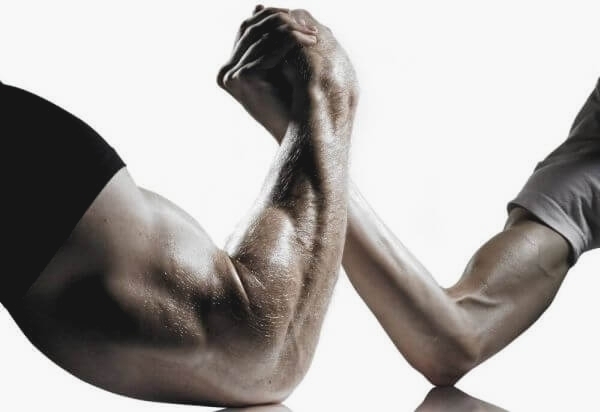 How do muscles grow? The answer is mathematically precise.
How do muscles grow? The answer is mathematically precise.
Protein is the basic building block of muscles and all other tissues in the body. When you consume protein, the body breaks it down into its component parts – amino acids. Then the amino acids are carried through the blood into different parts of the body in order to create protein for the cells that need it.
Muscles grow through protein synthesis. Synthesis means production of a substance (protein) through combination of simpler substances (amino acids) and it is the process through which proteins are added to the cell to make it grow.
The word synthesis comes from the Greek word syntithenai (syn – together; tithenai – to put/place).
The main protein synthesis activators are testosterone and growth hormone.
The growth of muscles
 Muscles grow through healing the micro-tears that appear on a cellular level during weight training. This sufficiently happens only if there is sufficient amount of testosterone and HGH. Weight training is directly responsible for muscle growth, but it is important what do you do after the training for those micro-tears to heal. Resistance training is the best way of stimulating muscle growth.
Muscles grow through healing the micro-tears that appear on a cellular level during weight training. This sufficiently happens only if there is sufficient amount of testosterone and HGH. Weight training is directly responsible for muscle growth, but it is important what do you do after the training for those micro-tears to heal. Resistance training is the best way of stimulating muscle growth.
When micro-tears appear, concentration of blood increases in those places, bringing the necessary components for repair through protein synthesis. The repaired muscle becomes stronger and more resistant than before.
How do muscles grow? Here are the required elements for muscle growth
Several components are required for activation of muscle synthesis and muscle growth.
- The muscle must have micro-tears caused by resistance training.
- There must be certain hormones naturally present, as testosterone and human growth hormone.
- You need proper nutrition with sufficient amount of protein and fats.
- You need good 8-hour sleep, as muscle synthesis and muscle repair is performed mostly during sleep.
What does a good training program mean? It’s a program that’s built upon these principles. For example a training program that contains millions of isolation exercises and long hours of training, cardios, etc., will slow down protein synthesis, i.e. the growth of muscle tissue. Muscles don’t grow from training, they grow from proper training supported by proper nutrition.
Mathematical explanation
The equation: How Do Muscles Grow
BUILDING MUSCLE MASS equals PROTEIN SYNTHESIS minus MUSCLE PROTEIN BREAKDOWN
Knowing this equation you can determine that:
- That which positively influences protein synthesis, helps to increase muscle mass.
- That which influences muscle protein breakdown, prevents muscle building and decreases the actual muscle mass.
- That which slows down protein synthesis, slows down muscle building.
Resistance training creates the need for protein synthesis in exercised muscles. Then if it was properly done, stimulates hormones that bring about protein synthesis in the muscles. This synthesis is activated if you have enough protein intake and is performed mostly while you sleep.
Disrupt your sleep and you’ve disrupted protein synthesis, resulting in slower gains.
If you only exercise without enough protein and fat intake and sleep, you are actually causing decomposition of muscle mass.
One of the factors that cause muscle breakdown is the hormone cortisol when higher than normal.
- Disrupted sleep = more cortisol.
- Stress = more cortisol.
- Overtraining/excessive running = more cortisol.
- Malnutrition = more cortisol.
- More cortisol = less testosterone and less HGH.
One of the factors that slow down protein synthesis is insulin, when higher than normal.
- Intake of carbohydrates (bread, sugar…) = more insulin
- More insulin = less human growth hormone
- More insulin = accumulation of more body fat
- More body fat = more estrogen
- More estrogen = less testosterone
Our nutrition and training programs take care of all these factors. Besides, there is no better education than achieving superior results with properly directed knowledge and effort.
Get a proper program for you





